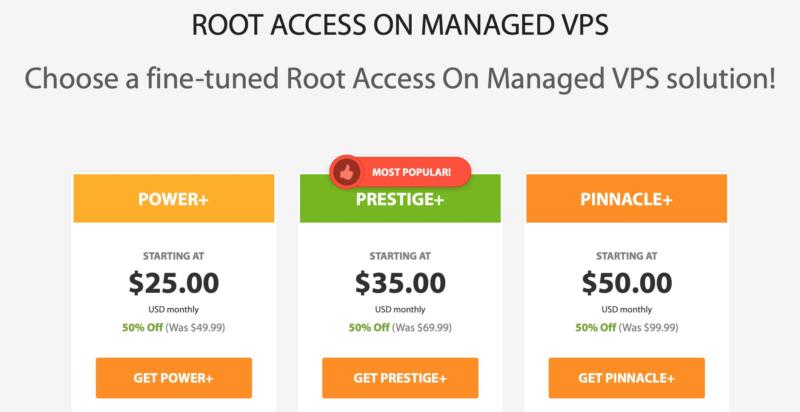- Oct 24, 2019
 0
0- by A2 Marketing Team
So you’re thinking about getting a Virtual Private Server (VPS) to host your website. However, with so many different web hosts available, how will you know which one is right for you? It’s important to understand your needs, so you can make an informed decision when selecting a plan.
For instance, a quality VPS provider should have high server uptime and first-class customer support. What’s more, there’s reliability and overall performance to consider, not to mention pricing. Fortunately, it isn’t hard to make a strong choice if you know what to expect.
In this article, we’ll start by explaining why not every VPS provider is the same. Then we’ll outline several key criteria to look for when shopping for a VPS host. Let’s get started!
Why Not Every VPS Provider Is the Same
When a web host uses virtualization technology to split one server into multiple virtual servers, you get several partitioned sections. These are then available to website owners. As such, when you choose a VPS plan, you are getting one of these virtual servers all to yourself.
One of the main reasons to choose a VPS plan is for the resources it offers to your website. Unlike with shared hosting, you won’t have to worry about other sites taking up server space and using up the bandwidth. A VPS can help make your website run more smoothly, with faster page loading times.
However, while it’s easy to see a VPS as a simple upgrade from shared hosting, there are other perks that come with a VPS besides speed. However, exactly what you get will depend on which hosting provider you opt for. The company you host your site with will also have a significant impact on its performance and security — which means this is a decision you’ll want to make carefully.
What to Look for in a VPS Provider (5 Key Factors)
Fortunately, knowing what to look for ahead of time can help make the process easier. Taking into account the following key factors prepares you to select the best VPS provider for your needs.
1. Consider Server Uptime and Performance
Server uptime represents the amount of time a server is fully-functional and online. The reason this is so important is that when a server goes down, so does your website. In other words, you want your VPS provider to have the highest uptime possible, to ensure that your site is always available.
What’s more, the provider you select has an impact on site speed and page loading times. Slow speeds can drive visitors away, so you’ll want to work with a company that’s optimized its VPS servers for maximum performance.

Here at A2 Hosting, for example, we offer a 99.9 percent uptime commitment with our VPS plans. In addition, our plans are supported by many performance-enhancing features, such as Solid State Drives (SSD), highly-optimized servers, and even a Content Delivery Network (CDN). This enables you to focus on designing and running your website, rather than worrying about performance.
2. Find a VPS With Root Access If You Need It
Root access gives you full control over your server. However, not every VPS plan comes with this option. In fact, some web hosts don’t offer it at all.
With root access, you can edit whichever files you choose and install server-wide software, such as MySQL and Apache. You’re also free to work with whatever Operating System (OS) you like. For developers in particular, root access can be a crucial feature to have.

Of course, if you’re not a developer, having root access might not be a priority. If it is, however, we offer it on many of our VPS plans, including some of our managed options (more on that later).
3. Look Carefully for Customer Support
Customer support can help you immensely with setup and website management. Even the most experienced site owners and developers can sometimes need assistance. Plus, quality support is generally a good indication that you’ve found a web host you can trust.
Different VPS providers offer various levels of support. As a result, you may want to look into how customer support is accessed for each provider, and what hours of the day it is available. For example, does the host have a phone number, email address, and live chat option?

As far as we’re concerned, we’re happy to boast about our top-notch support. Not only do we offer friendly service via any of the above mentioned methods, but it is also available any time of day or night. In other words, you’ll always be able to reach out and get help when you need it.
4. Match Your Needs With a Managed or Unmanaged Plan
VPS hosting plans come in two primary flavors: managed and unmanaged. With a managed plan, your hosting provider will handle most server-related issues, as well as some of your site’s maintenance and optimization. On the other hand, an unmanaged plan offers you more control, and enables you to configure your VPS however you choose.
The plan you opt for will depend on your needs and experience. For instance, you may want a managed plan if you don’t have a lot of knowledge about servers, and you prefer to focus on other aspects of your business. On the other hand, if you’re looking for the freedom to set up your VPS however you like, an unmanaged plan may be right for you.

It’s also worth noting that an unmanaged VPS plan can be significantly cheaper than most comparable managed plans. On the other hand, the added cost of a managed plan can pay off quickly in saved time and reliable website performance.
5. Compare the Costs and Benefits for Each Plan
Cost is, of course, is a major consideration when selecting a hosting plan. Unless your budget is extremely restricted, however, it’s important to not just go with the cheapest host you can find. Instead, you’ll want to look carefully at what you are getting for the money you’re investing in your site’s hosting.
VPS pricing tends to depend largely on each plan’s technical specs, such as the RAM and bandwidth you’re getting. RAM determines how many sites and applications you can run at the same time, while bandwidth is the amount of data you are allowed to transfer in a month. How much of each you will need depends mainly on how large your websites are, and how many you are managing on the same VPS plan.

Of course, it can be difficult to predict exactly what your site will need, especially if you haven’t built it yet. Reaching out to your prospective provider’s support and asking a few questions can help. In addition, it’s a good idea to look for a provider that makes upgrading your plan simple, so you can pay for what you need and access more resources as your site grows.
Conclusion
When choosing a VPS provider and plan, there are many factors to consider. You’ll want to know exactly what you’re getting and how it matches up to your site’s needs, so you are able to make an informed decision before jumping on board.
In this post, we’ve discussed five key factors to consider when choosing a VPS provider. Let’s quickly recap them:
- Consider server uptime and performance.
- Find a VPS with root access if you need it.
- Look carefully for customer support.
- Match your needs with a managed or unmanaged plan.
- Compare the cost to the benefits the VPS provides.
Image credit: geralt.












